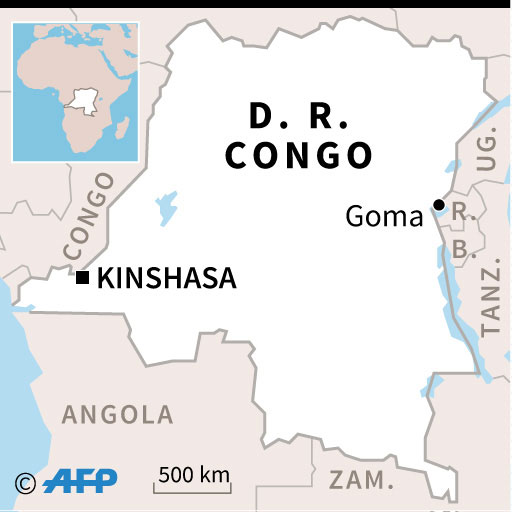
Goma, DR Congo | AFP | Coronavirus has swiftly gained status as the world’s No. 1 threat but in eastern DR Congo, one of Africa’s most volatile regions, militia killings and ethnic violence are an older and — for now — far greater source of dread.
Some 2,000 kilometres (1,200 miles) distant from the capital Kinshasa, this beautiful region bordering Uganda, Rwanda and Burundi has been a notorious flashpoint since the Congo Wars of the 1990s.
“The COVID-19 crisis must not make us forget the atrocities which are taking place in the east of the Democratic Republic of Congo,” 2018 Nobel peace laureate Denis Mukwege said on Tuesday.
In the provinces of Ituri and North Kivu, “civilians are being massacred,” he said.
“In South Kivu, Rwandan and Burundian armies are battling armed groups in the high plateaus of Minembwe, destroying everything in their wake,” Mukwege said.
“And in Tanganyika, the Zambians who had until now had good neighbourly relations with DR Congo… recently invaded our territory.”
Mukwege co-won the coveted prize for his treatment in helping women raped by armed rebels in South Kivu.
The Kivu Security Tracker, an NGO which documents bloodshed in the two Kivu provinces, said March was one of the least violent months it had recorded — 47 deaths against 87 on average.
“But since then, the violence has resumed,” an expert with the group said. April saw 85 civilian deaths and 60 incidents, which was higher than the average of 51.
Since November, more than 400 civilians have been butchered in North Kivu province by the Allied Democratic Forces (ADF), a mainly Muslim militia.
In Ituri province, nearly 300 civilians have been killed and around 200,000 have fled their homes since March.
The authorities blame the crisis on a political-religious sect called the Cooperative for the Development of Congo (CODECO).
The organisation is mainly drawn from the Lendu ethnic group, who are predominantly farmers and clash repeatedly with the Hema community of traders and herders.
North Kivu and Ituri are also hosting an epidemic of Ebola, which has killed 2,279 people since August 2018.
Militia violence has badly hampered the effort to end the outbreak, which depends on grassroots work to isolate cases and trace people who have been in contact with them.
Over 1,600 cases of coronavirus have been recorded in the DRC, but fewer than two dozen have occurred in the east.
– Not just coronavirus –
For displaced people in Ituri, “I don’t think that COVID-19 is the prime worry,” said Avra Fiala of Doctors Without Borders (MSF).
“They have makeshift shelters, sometimes no shelter at all, no showers, not enough toilets.”
The UN children’s agency Unicef said that worsening violence had destroyed 22 health centres in North Kivu, wiping out stocks of vaccines, while more than 160 schools had been damaged or looted.
“Conflicts do not stop with epidemics,” said Fatima Sator, a spokeswoman for the International Committee of the Red Cross (ICRC).
“Coronavirus adds to a long list of existing (health) problems — various armed conflicts, other epidemics such as measles, cholera, Ebola, malaria, and very great difficulties for the public to access treatment.”
Sator said the ICRC was “continuing our work in the east, but adapting to the measures to prevent coronavirus.”
For instance, aid workers, in their “awareness sessions” with armed groups, no longer carry out such contacts face-to-face but over the phone.
 The Independent Uganda: You get the Truth we Pay the Price
The Independent Uganda: You get the Truth we Pay the Price





